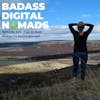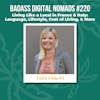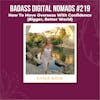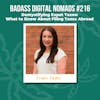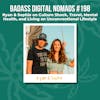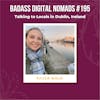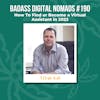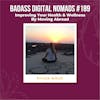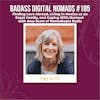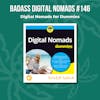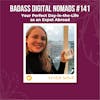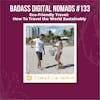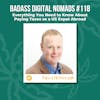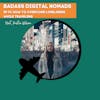Leaving the US and Spain’s Digital Nomad Visa Is Finally Revealed

Why record numbers of Americans are leaving the US for Europe. Plus, Kristin’s thoughts on global immigration and details on Spain’s new digital nomad visa. Find out how you can live in Spain for up to five years. 🇪🇸
Why record numbers of Americans are leaving the US for Europe. Plus, Kristin’s thoughts on global immigration and details on Spain’s new digital nomad visa. Find out how you can live in Spain for up to five years. 🇪🇸
Episode 174 Special Offers:
- Apply to join Kristin’s Relocation Program
- Get access to the Digital Nomad Visa Database
- Buy Kristin a Coffee
IN THIS EPISODE:
- Why Americans are leaving the US for Europe
- Kristin’s decision to leave the US (again)
- Reflections on the state of global immigration
- Details on how you can qualify for Spain’s Digital Nomad Visa: income requirements, length of stay, and tax implications
RELATED PODCASTS:
- Living in Spain as a Digital Nomad Couple
- International Taxes for US Expats with Greenback Tax
- International Taxes for US Expats with Gracefully Expat
- Zero to Travel World Walk Podcast
RELATED VIDEOS:
Connect with Kristin:
- Follow on Instagram
- Subscribe to Traveling with Kristin on YouTube
- Subscribe to Kristin’s weekly newsletter
- Join the Badass Digital Nomads Facebook Group
...........................................................................................
Support the Badass Digital Nomads Podcast:
Ready to Relocate:
Kristin: 00:00:00 Do you have plans to move to a new country in the next year or so but feel bogged down and overwhelmed with all the details? Would it be helpful to you and give you peace of mind to be able to work with me over the course of three months to plan your relocation and check in with me on a weekly basis? If that sounds like you, then set up a call to talk with me at travelingwithkristin.com/apply. That's Traveling with Kristin, K R I S T I N.com / A P P L Y.
Introduction: Welcome to Badass Digital Nomads, where we're pushing the boundaries of remote work and travel, all while staying grounded with a little bit of old school philosophy, self-development, and business advice from our guests.
Kristin Wilson, Host: 00:01:01 Hey there, Kristin, from Traveling with Kristin here and welcome to episode 174 of Badass Digital Nomads. Exciting news this week as Spain has just announced that it's new digital nomad visa, which could allow you to live and work in Spain for up to five years is actually happening. There's been buzz about this for almost a year now, I think. So it's apparently official, it's really happening and I have all the details for you in today's episode. More on that in just a minute. But first, I hope you've been liking all of the new interviews this year. We've got a lot more to come throughout the end of the year and lots of other interviews on deck for 2023, so I'm really excited to share those with you. I also want to thank Fatimzie for buying me three coffe`es. Recently. They say Your podcast changed my life in 2019.
Kristin: 00:02:07 I was depressed in the corporate world and was in search of an alternative lifestyle. I am now finally location independent and have lived in four different countries this year, Canada, Costa Rica, France, and Morocco. Thanks so much for inspiring us. Even though you don't know us, your mission is definitely changing the lives of many. Thank you so much Fatimzie for the coffees. So glad to hear your story and how your life has changed since you started listening to the podcast. That's amazing, and coffees are always welcome to help fuel this podcast over at badassdigitalnomads.com/support. I also have some news that I am leaving the US again, so that's official as well. I will be sharing all of the details with you in an upcoming podcast and my plans for what I'll be investigating over there and reporting back for you. You know, this is a very dynamic time in the world.
Kristin: 00:03:18 It's changing so fast and I'm a little intrigued and also apprehensive about going nomadic again because I just don't know what it's gonna be like compared to before the pandemic. There's a lot of reports about American driving the prices up everywhere and quote unquote ruining certain places, but obviously the inflation cost of living political stuff and a lot of different factors combined in the US has made for what appears to be an unprecedented exodus of US citizens abroad. I know we've been really busy over here with relocations, both in my group program Ready to Relocate and with one-on-one relocations. Um, Ready to Relocate is actually open right now for enrollment. So if you want to get in before the end of the year and get my help planning your relocation for 2023, then the link is in the show notes or you can apply at travelingwithkristin.com/apply and chat with me on the phone.
Kristin: 00:04:37 But yeah, immigration has definitely been on my mind lately as well as just general mobility, not necessarily moving permanently to countries, but also just going for a year or so, which a lot of these digital nomad visas are giving you the opportunity to do. There was an article that came out in Bloomberg that said Americans who can't afford homes are moving to Europe instead, where they actually featured some retirees and other people who are just leaving the US to buy real estate abroad because it's more affordable and they can have a better quality of life that way. And it's just so surreal having been a realtor working in other countries, he –helping people invest in real estate abroad, that this is now becoming a mainstream thing right before our eyes. So it, it's definitely an interesting time and it's not just retirees but it's people of all ages now and Spain has been one of the more popular destinations for US citizens going to Europe.
Kristin: 00:05:47 And the article said that the number of US-born residents rose 13% between 2019 and 2021 and demand continues to rise. Other real estate outlets in Europe, including Sotheby's have said that they've seen an increase in demand from US citizens by up to 40% year over year. And that is wild. On the flip side, however, and probably because I've been thinking about leaving the US again, I've also seemed to attract stories from other people in my surroundings in Miami about why they chose to move to the US life is -- it's such an individual and collective experience at the same time and everyone is shuffling countries for different reasons. Some because they want to, some because they need to, some because they're forced out due to war, poverty, famine. So many reasons. This is just one of the first times or the first time that so many people potentially billions of people have the opportunity to voluntarily change countries due to situation and circumstances that we find ourselves in today with the ease and speed and affordability of international travel.
Kristin: 00:07:21 But just this morning I was at the doctor getting, you know, getting all of my doctor's appointments and checkups before I leave the US and I went to a new doctor and the doctor and the entire staff and the office were all Cuban, like nobody even spoke English in the office. Fortunately I speak Spanish, but even when I made the appointment they were like, uh, Hablas español? and I was like, Si. So I thought, okay, maybe the person who answered the phone didn't speak English, but no, everybody in there only spoke Spanish. But I had such a great experience and a great chat with the nurses and the girls at the front desk and the doctor was super friendly and I was there for at least an hour or so and they were like giving me Cuban coffee and Pastelitos which are like the little pastries with the guava and we were just talking and chatting and um, one of the nurses was opening up to me about her journey immigrating to the US and coincidentally she was able to come to the US because she got her Spanish passport through the consulate in Cuba.
Kristin: 00:08:42 So her family was of Spanish descent and she was able to get that passport and then it took years for her daughter to also get her Spanish passport in Cuba, uh, because of the situation there, the government, uh, the corruption, it, it just, they had to pay extra money. I think she said something like it could cost up to $13,000 to expedite quote unquote the passport, uh, to get her European passport. So they were able to, uh, the mother and daughter were able to get their passports come to the us. Her husband flew to Nicaragua and then entered through the Mexican border back during the Obama years before they shut down whatever program was going on then. I was living abroad at that time, so I don't really remember, but the whole entire process took about nine years that her family was split up with her husband making his way to the US and then her being able to fly to the US because she had her Spanish passport and then waiting years for her daughter to be able to get her passport and then joining her parents in the US.
Kristin: 00:10:03 And I know that there's millions and potentially hundreds of millions of stories just like that, but it really made me think and it really made me feel partially grateful and also partially guilty about the freedom that I was born into and that so many of us were born into. You know, the US has a lot of problems, but it is just so vivid when you see this stark difference between the plight of Cubans trying to come to the US and then us born citizens that have so much more freedom of movement to be able to go to other countries without having to split up their families for nine years. And no matter you know, what site of the aisle you're on or what your views on immigration to the US are, I was just fascinated by hearing her story and I really wasn't aware of all of the paperwork.
Kristin: 00:11:09 And so once she had her family here in the US, they were able to apply through a program for Cuban citizens that arrive legally to the US to be able to apply for residency that way. So she said that worked out, but it was also interesting to hear her perception of coming to the US just this week I spoke with her, and then I also was listening to a podcast that I'll link in the show notes. It was the Zero to Travel podcast with a guy who walked around the world for six or seven years, I think it was six continents, seven years, something like that. And he was also talking about his perception of coming back to the US the pros and cons, right? Because there's always multiple sides. He was talking about the things that he took for granted living here and he was also talking about the, the problems here and um, how grateful he is that he can complain about the problems and that we have freedom of speech and freedom of expression.
Kristin: 00:12:18 But anyway, my nurse Lordes, she said that she almost fainted when she came to Walmart for the first time. I think she was in her forties, she's lived here for about 10 or 15 years now. But she said that the first time that she went, she just literally couldn't believe her eyes and was just overwhelmed with the wealth, the selection of products, the diversity and just overcome with emotion, which is something that, you know, growing up with a Walmart down the street, it's never occurred to me that people would have a visceral emotional response to being in a Walmart for the first time. But when you think about it, I mean I've been, I've been to Cuba once, not for very long, but I saw the poverty, I saw the, the lack of basic ingredients, lack of food, and it's hard to imagine living under those conditions where you're trapped on an island and you just take what you can get.
Kristin: 00:13:31 I mean, she was saying that the abundance here is so mind-boggling to this day that she still kind of has a hard time processing it, especially when her family and friends are still back in Cuba and they're wondering where their next meal is going to come from or when their next, they're going to have their next meal. She was telling me about the first time she ever tasted strawberries and grapes and that she ate like a whole bowl of grapes and pistachios because apparently there's no dried fruit or nuts in Cuba. She said all they have are peanuts which are actually legumes and she just had never tasted nuts before. And having pistachio ice cream for the first time was like a life-changing experience. And those are kind of the little things that that really humanize what happens when you move across a border.
Kristin: 00:14:30 The culture shock that we all experience when we go to another country to see it from her perspective coming from Cuba to Miami and kind of the overwhelm that she experienced and and also hearing her explain how much her quality of life has increased by coming here. It was just really impressive. But at the same time, the US is fraught with a lot of problems and there's so many people that are leaving the US and I'm one of them and it's something I've done multiple times now. So that's just been on my mind how many different people are seeking different things. And the people that I was surrounded by in the office today, all of them wouldn't think of leaving the United States again. And yet so many people are leaving the US in search of new and different opportunities, a better quality of life, and that's okay too.
Kristin: 00:15:36 So I've kind of been towing this line between really sitting in the gratitude for having been born in this country and the opportunities that I have because of it also acknowledging the comfort that we have here and the infrastructure and the amenities, but then still recognizing that there's more out there to see in the world, there's more to do, and that if you are feeling drawn to another place or called to go to another place, that's okay too. Two, and I was interested that I asked the doctor, what do you like the most about America? And he said, comfort and freedom. And I would have to agree anyway. If you are planning on leaving your current location to head to Europe, then Spain or Portugal have probably been on your radar at one time or another. Portugal doesn't have a digital nomad visa, but they have other types of visas such as the D7 visa that we talked about recently in the episode with Expats Everywhere.
Kristin: 00:16:51 That'll also link back to, in case you missed it, but this is big news for Spain to offer a digital nomad visa and maybe we will see Portugal and France and some of the surrounding countries offering one in the near future as well. So the gist is that they plan to offer the visa to non-EU or non-EEA citizens. So that includes the rest of US, British citizens included. So we would have the opportunity to apply for a digital nomad visa valid for up to one year with the possibility of extending for up to five years. This could be for one person. You can also bring close relatives and family members with you. So if you're traveling with a spouse or with children or maybe even other close relatives, they could be eligible as far as qualifying for the visa, apparently, they will require you to prove that you've worked remotely for at least one year, and that can be either with an employment contract for a remote company, a non-Spanish company or proving that you work as a freelancer.
Kristin: 00:18:10 Now interestingly, Spain is one of the only countries that I've seen, if not the only one that also has a provision that up to 20% of your income can be from local Spanish firms. Most other countries have said all of your income has to come from outside of that country. So that's interesting that Spain is including this provision, but they also will be requiring candidates who receive the visa to pay an income tax of 15%. For the first four years, they haven't started accepting applicants yet. So this is still very new news. So we'll have to see how the exact details shake out, but that is the situation right now. And they'll also want you to prove that you have enough income to live there and that hasn't been specified yet, but it's expected to be around 2000 euro per month. So that's pretty reasonable compared to some other countries in Europe which are requiring 3,500 up to 7,000 euro per month.
Kristin: 00:19:21 2000 is pretty good. Now, Spain's digital nomad visa was anticipated for a while because allegedly the government was tightening up on remote workers applying for the Spain non-lucrative visa, which was previously one of the most popular ways to live in Spain long term. The thing was that the non-lucrative visa was created for retirees or people with passive income and many remote workers and digital nomads and travelers who were working online were applying for it using the income from their employment, which it wasn't really designed for. So although that program is still available, it seems like the government wants to encourage more retirees to apply for the non-lucrative visa and direct the remote workers over to the digital nomad visa. That spoiler alert also has that 15% tax. And if you have questions on the tax aspects and wanna dive deeper into that, I'll also link to the podcast episodes we did with Greenback tax services and Grace of Gracefully Expat where we go into detail on paying international taxes.
Kristin: 00:20:49 So I would think, I'm not an accountant or financial advisor disclaimer, but I would think that if you end up paying income tax in Spain, that you would be able to deduct that from any income tax that you pay in your home country. But of course, it depends on the country. I would think that would be the case for the US. But if you are from a non-US country, you also have the option of changing your tax base anyway, so you might want to change your tax base to Spain semi-permanently. I'll also link to my Living in Spain video, so you can get some more info on the cost of living in different cities around Spain. And if you're interested in digital nomad visas and other places around the world, we are actively updating the Digital Nomad Visa Database at the moment. So you can get access to that for about $1 per country.
Kristin: 00:21:44 It's only $47 and there are 50 digital nomad visas now and counting. So we're adding more to the database and we'll just keep on adding them as they come out. Bali announced their digital nomad visa this summer, so lots more countries potentially all of them eventually offering some form of a digital nomad or remote work visa Thailand with their 10-year digital nomad visa. And the big benefit of these visas, even if you qualify for residency in another way, as an investor, as a retiree, a lot of these digital nomad visas you could potentially apply for having some sort of a pension or passive income and it, it could be an easier and faster way and cheaper way to go and live in these countries if you're just planning on going there for a few years. Now, if you're looking for a path to citizenship, most of these do not offer that, but it is a good option if you wanna go somewhere for one year, two years, five years in the case of Spain.
Kristin: 00:22:57 That's pretty good. And who knows what will happen in the next five years. We'll have many more digital nomad visas and maybe countries will reach a comfort level with this, where they will begin offering digital nomad and remote work visas as a path to permanent residency or citizenship. I see that as the next logical step. So a little bit of a shorter episode for you guys today, a news update as it were, and I think you'll love next week's interview with Karen, one of my Patreon patrons who will be sharing why and how she moved permanently from Canada to Albania. Don't miss that one. Hope you're having a great morning, afternoon, or evening wherever you find yourself in the world today, and see you again next week.
Kristin: 00:23:54 Kristin here. I hope you enjoyed today's episode. And if so, why not share the love. You can support the show by leaving us a five-star review wherever you listen, or by sharing today's episode on social media or with your family, friends or coworkers.

Kristin Wilson
Host of Badass Digital Nomads & YouTube's Traveling with Kristin / Author of Digital Nomads for Dummies
Kristin Wilson is a long-term digital nomad and location-independent entrepreneur who has lived and worked across 60 countries in 20 years. Since founding a fully-remote, international relocation company in 2011, she has helped more than 1,000 people retire or live abroad in 35 countries. Today, she helps aspiring remote workers, digital nomads, and expats achieve their lifestyle goals through her YouTube channel (Traveling with Kristin) and podcast, Badass Digital Nomads.
Kristin is the author of Digital Nomads for Dummies. She's also a Top Writer on Medium and Quora in the topics of business, travel, technology, life, productivity, digital nomads, and location independence. She has been featured on The Today Show, Bloomberg Businessweek, Business Insider, ESPN, The New York Times, WSJ, Huffpost, HGTV’s House Hunters International, and more.



























